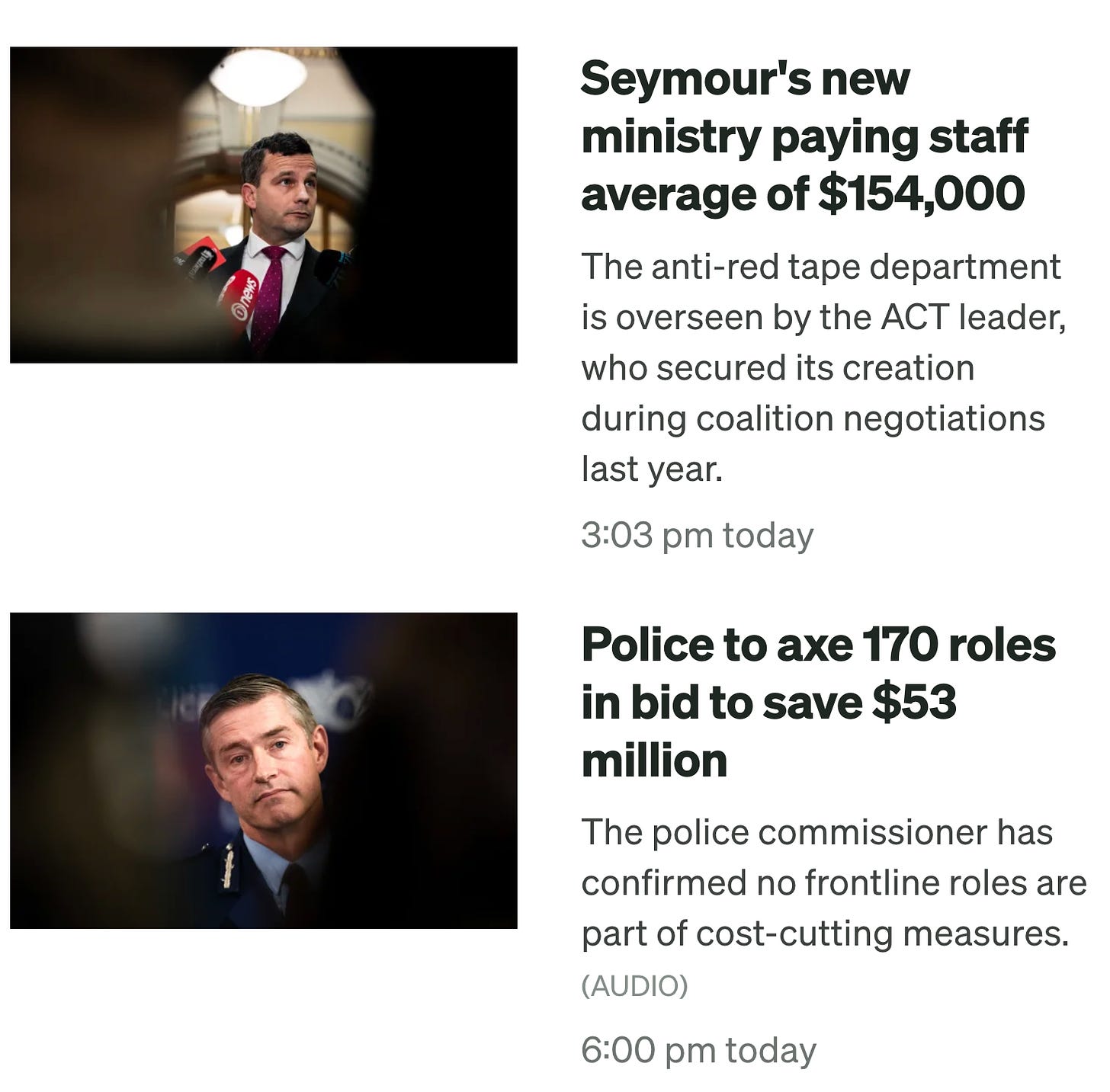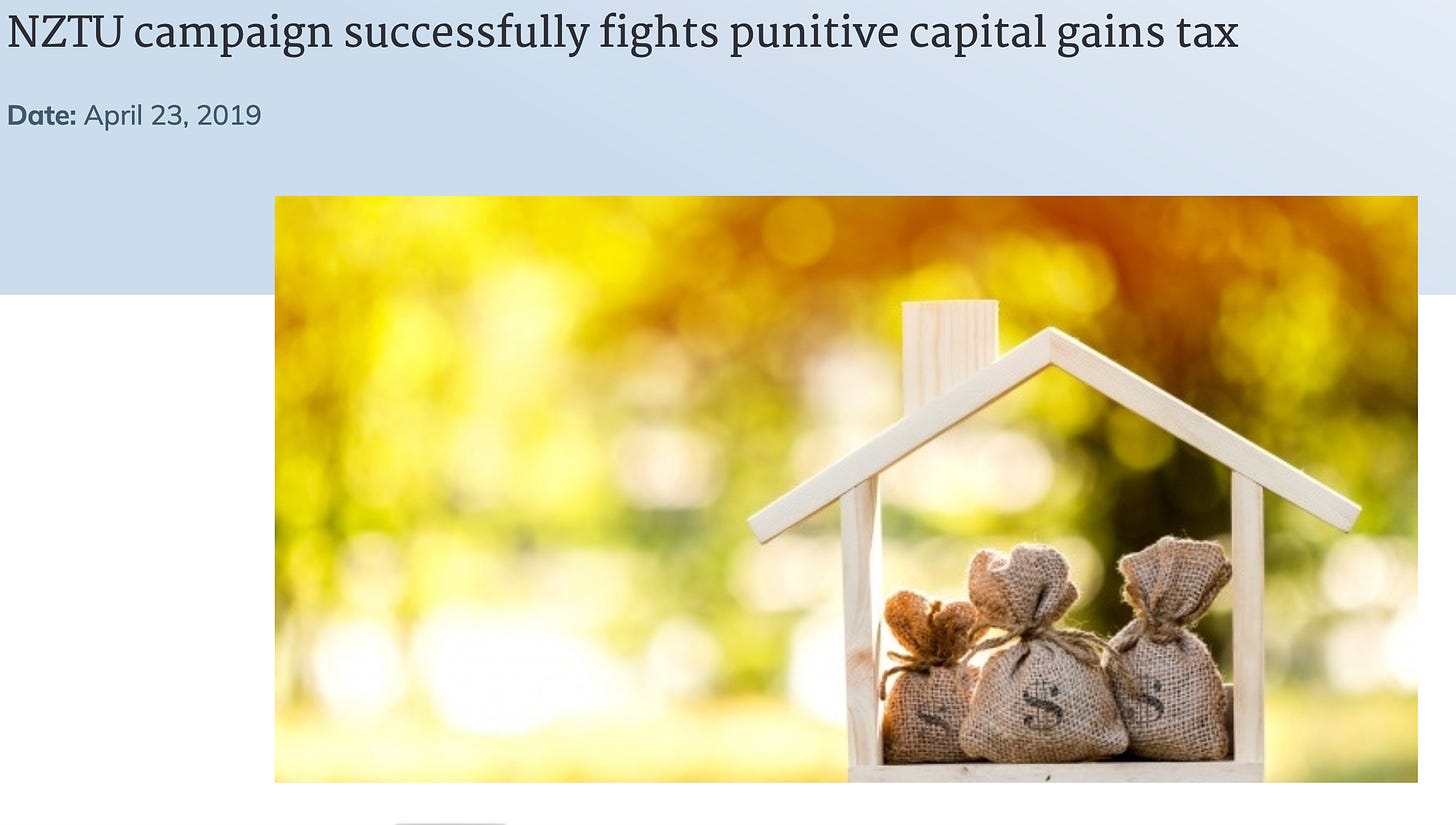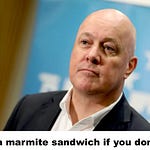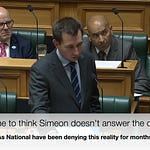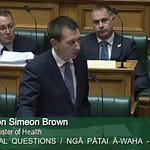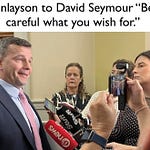Synopsis: David Seymour’s Ministry of Regulation aims to be one of a trio of regulation pillars in NZ - alongside RBNZ and Treasury. Seymour’s Regulation scope extends far beyond any Ministerial power, allowing him to set up, define and enforce standards around what is, or isn’t good regulation across government i.e. for laws and rules that govern NZ.
For a party that won 8% of the votes, Luxon’s allowances to Seymour have been extraordinary. And even though Seymour tries to paint his neoliberal, liberatarian regulation agenda as “for the people” and “for democracy”, one has to ask - is this democratic and sensible?
Finally, a re-examination of why those who called David Seymour the “most dangerous man in NZ” might be onto something after all.
Andrea Vance reports that David Seymour’s new Ministry of Regulation workforce earns an average salary of $154,000 with 91 staff:
“The median ministry salary is 82% higher than that of the average public servant, which is $84,000.”
Credit to Green Party MP Francisco Hernandez for asking the question.
A few months ago, I called Seymour’s Ministry of Regulation “Slush”, because I think there is something offside with setting aside ~$230 million of NZ taxpayers’ money for Seymour to play kingmaker and hobbyist - especially as the government is cutting funding from police, health, corrections, justice, Oranga Tamariki and more.
Today’s RNZ headlines make the point well -
Slush is a play on words from when National and ACT used to attack Shane Jone’s Regional Infrastructure Fund as a ‘slush fund’ under Labour - but now Jones is with them, it’s just a ‘respectable, high growth investment fund.’
The power of words.
Well the run rate for Seymour’s Ministry increases to $20mn a year by 2026, giving him a budget of ~$80mn over the next four years.
Combined with the $153mn he received for charter schools (double the funding charter schools received last time around), Seymour’s sitting on a pretty taxpayer penny of ~$230mn to run hobby projects - even as he attacks others for wasting taxpayers’ money, and our critical services get cut.
To lead the Ministry on operational matters, Seymour appointed Gráinne Moss, ex-Oranga Tamariki CEO, and excellent long range swimmer, who left OT in 2021.
She resigned with some disrepute at the time but Moss also has an interesting work history.
Here’s a Melanie Reid and Bonnie Sumner excerpt re: some of that in 2020:
Newsroom understands a number of people raised issues about the way they were treated during Moss’ time at Bupa and we have been told some have received outside counselling as a result..
“I was challenging her and she thumped the table… Even on her team if she didn’t like you, you wouldn’t get invited to certain things. She would openly challenge and embarrass you in front of others. Her brand is very important to her… working with her, if you’re on the outer she will make that known, too.”
For Seymour though, she is the right person.
In March, for her appointment, he said:
"I see her as being a victim of exactly the sort of politics that the ACT party has campaigned to stop over the past few years.”
“And I believe, from my interactions with her, that she has exactly the kind of characteristics that are required to get people enthused about a new job and enthused about a new workplace.”
I believe Seymour, but I also can’t help but draw parallels to the Project 2050 strategy which involves appointing people who once lost against the ‘establishment’ -
“We want people who’ve been cancelled”
says Paul Dans, the Project 2025 Director up until very recently, as he articulated a key pillar of the Atlas strategy is to appoint ideology friendly people into government.
This is what makes the NZ government’s appointment of Stephen Rainbow as Human Rights Commissioner, who reportedly made anti-trans and pro-Israel comments, and Melissa Derby as Race Relations Commissioner, who is associated with Atlas Network and is a Maori-rights skeptic with questionable trans comments herself, the ‘new normal’.
And Goldsmith et.al want you to know that.
The money for Seymour is a rub, but there’s something more jarring hidden in the Ministry of Regulation remit
I have no idea what world Luxon lives in, what with his seeming 22% CEO, 88% Marketing, and 0% Maths skills, but to give Seymour a blanket remit called Ministry of Regulation is irresponsible, or potentially, from National’s perspective aligned goals.
Let’s be clear what the Ministry of Regulation is about -
It is a department set up to judge, monitor and enforce how laws and regulations are seen, and if they should be passed, in NZ (for “quality” according to Seymour).
Seymour:
“In some ways, this (Ministry) is a giant exercise in allowing voters to identify bad regulation so we can stop making it, so we can delete it, so we can get rid of it, so people can spend more time doing transformational activity.”
Seymour will have powers not only to define the envelope for judging which laws are desirable, and which get negative or positive publicity, his Ministry will be in charge of enforcement too.
Remember, Seymour always talks as if he is promoting democracy and transparency so his use of the word voters is a proxy for the marketing slogans he will want them to hear, aka his approach to the Treaty Principles Bill, where experts are denigrated as “activists” when their message doesn’t suit his agenda
On top of that, he also gets to choose any topic to run ‘regulatory reviews’ on.
And I’ll give you an example of the ACT lens on business/worker regulation:
This year, Brooke Van Velden refused to give a timeline to look at engineered stone products that are known to kill workers because she didn’t want to impact the economy or burden businesses with regulation. “Give me time, Jack,” she said to Jack Tame. Well Australia has already banned it and despite multiple calls by health bodies and unions, and its firm linkage to deaths, Van Velden has not moved an inch on it.
That’s an example of light touch regulation if we want to extrapolate ACT’s way of looking at regulation.
Significantly, no-one appears to be managing Seymour here on any of this - he chooses what he wants to do, which standards to apply, and what criteria he is going to use to decide what is best - and he gets to force other departments to apply his framework of “quality assurance”.
His first two Ministry of Regulation topics are underway1 and Seymour claims a new Regulation law “will help voters in our democracy monitor regulatory activity”.
If I can translate, it sounds like he intends to use populist tactics and call that “democracy” i.e. bypass experts and use emotive slogans based on anecdotes and stories to win over the peoples’ vote.
If you want to think of an example of voters deciding for themselves, Brexit is an excellent example because it showed what populism can do for those who want to wield it for their own power under the guise of slogans like “Britain first” and prosperity for all British.
(Spoiler: Brexit happened. Britain just went back decades and is in a bit of pickle with councils all over the country going bankrupt and their health system flailing badly and more people than ever suffering poverty. And by the by, the society is divided and unhappy with recent far-right riots)
Another example is how Taxpayers Union, ACT and National’s partner, influenced the outcome of CGT in NZ. These are all strategies that appeal to the people through populist slogans and selective context.
More insights from Seymour
To be clear, Seymour defines regulation (Finance and Expenditure Select Committee meeting) as:
“The placing of restrictions on the use and exchange of private property.”
But his definitons are flexible.
He argues that “air quality” is part of that remit - because air quality involves how someone uses their private property.
And again, Seymour is head master of definitions and what makes rules and regulations worthwhile or not.
He gives hints though - it’s going to be defined by “economic analysis” and “market forces”.
He wants you to define the problem first before he thinks a law is needed, but on his terms, not yours.
For example, does he consider how regulation actually protects people and the environment? That it’s not just about costs of doing business, right, asks Green Party Julie Anne Genter -
“I just want to check that in the wide cost-benefit analysis of do the benefits outweigh the costs that we're also thinking about the people who are protected by the regulation or the commons that's protected, like, The atmosphere, the air. It's not just to focus on reducing costs for those who are doing business. It's about what's the overall impact.” (Genter)
Well when Seymour answers, he twists Genter’s question from costs to business to costs of emissions. He then makes up his own question and frames the “fundamental problem” for climate change and emission.
Seymour:
“You know, you take climate change and you take emissions of greenhouse gases. You know, you have to acknowledge that there's a cost to admitting them.
And then you say, OK, well, what's the problem we're trying to solve?
Well, fundamentally, it's a prisoner's dilemma. I would reduce my emissions if I could trust you to reduce yours, but you don't, and you don't trust me either, so both of us do our worst and we end up in a bad place together.
That's your fundamental problem.”
Is it, Seymour?
That’s the “fundamental problem” to solve around climate change and reducing emissions?
How about the numerous policies2 your government has implemented which will specifically increase emissions and cut our regenerative renewable capacity?
How about how you tanked the EV market, with some falling 90% in sales compared to last year.
How about how your government’s cancellation of Kiwirail’s iRex with hybrid technology will increase emissions?
Or how you axed agriculture from the Emissions Trading Scheme even though farm-related emissions make up 49% of New Zealand's greenhouse gas emissions.
Should we mention how you weakened our methane targets too in a move that has been called “problematic” and will contribute to New Zealand not being able to achieve its climate goals.
Or cancelling the Lake Onslow hydro energy project in a move that criticized as short sighted - and it does seem that it was right now.
As always Seymour over-complicates issues he wants to confuse people on - his old jedi trick of re-framing narratives, asking questions often completely unrelated to what you asked, intoning like a sermon with jargon and technical terms to appear knowledgeable, and if all else fails, play victim (see video above at 2:18) to give him time to try to get out of questions if he can.
Seymour has great ambitions for his Ministry, saying it could be one of the great monitoring trios of NZ society - next to the Reserve Bank of New Zealand, or Treasury, for the Public Finance Act.
Seymour:
“Thanks to Ruth Richardson, we have much better initiatives around finance and I think we can get to a similar place in terms of regulation, and for the same reasons,”
Again, throughout, Seymour positions his personal ambitions as ‘good for democracy’.
Yes - according to him, everything he does is ‘good for society, good for humanity, essential to democracies, great for transparency’. He is the man who will fight for your money and your dignity, your future and your interests against establishment - a populist and effective strategy.
But is it true, David? Are your opinions representative of democracy when you are bankrolled by multi-millionaires / billionaires like Alan Gibbs who is a mega donor and adherent to neoliberal Atlas?
Do we trust a man that grew up under Koch Brothers money and argued against public transport for right wing think tanks, right before becoming the ACT candidate?
Luxon has either let the fox “regulate” the rules of the hen house, or he is on that goal.
Seymour again:
“New laws, new regulations, should be tested against questions like, can we define a real problem that we're trying to solve here?
Specifically, is there a market failure?
And more specifically, can we see an outcome where the game theory outcome is not paranoid at all?”
Seymour said that far too often governments solve problems that don’t need solving
Yes. Can anyone think of one contrived problem that will cost big bucks and waste precious resources?
That’s right - Seymour’s Treaty Principles Bill. A monumental waste of time, money, energy and focus for a whole nation over a contrived problem that didn’t exist in the first place - although to be fair, it was a problem for foreign mining companies.
Seymour has form on creating contrived problems -
ex-Act staffer Grant McLachlan said ACT weaponised.. groups that masquerade as concerned citizens but actually push the interests of large corporates.
The Taxpayers Union “did a lot of the groundwork” for the Act Party in the 2020 election campaign through its Campaign for Affordable Housing.
“It was actually a contrived problem that the Act Party told them to create.”
Seymour also states that the burden of regulation may surpass the burden of taxes and government spending in society - echoing a Rupert Murdoch and Tory line about the perils of “red tape.”
Red tape must be cut away for good! bleats Murdoch’s papers consistently.
Finally, the Ministry of Regulation will also oversee the “quality assurance” of Regulatory Impact Statements
An example of an RIS is here:
It is an analysis document, based on understanding the goal to be achieved, and the pros and cons of various options. They are frequently quoted in media and are used as a good benchmark for what constitutes objective, in-depth analysis of issues.
Yet, it’s the same RIS this government commonly ignores - as it is doing with the repeal of 7AA. But apparently Seymour will be the one to help.
Of RIS’s Seymour gives an example of how it will work between his Ministry and another -
Seymour:
“It remains the duty of the proposing agency, if you like, the Ministry for the Environment, perhaps, to carry out regulatory impact analysis on its initiatives. However, the role of the Ministry of Regulation is to do QA and effectively be the upholder.”
And
“And then once we've defined (proper regulatory impact analysis) and we've tightened up the scope of it and what it really is, enforce that it's done at a higher standard, including consultation.”
You might get the picture - this is a a massive over-reach into all government department operations and law making.
Seymour plans to train his team how to enforce and spread this ideology too.
To be clear: There are elements of what he says that sound fair and reasonable e.g. no-one can - or does - argue about wanting better use of taxpayer money, effectiveness, transparency, productivity.
These are all big ideals that there is no dispute with, but once it’s been harpooned by Seymour it becomes problematic because his history, experience and record is poor - in other words, he’s more than once shown up as an immense hypocrite on multiple occasions e.g. his Guy Fawkes ‘joke’, attacking journalists including Benedict Collins, advancing a wasteful, divisive Treaty Bills Principle by inventing a problem that no-one ever asked for etc. etc.
Claiming to care about taxpayers’ money even as he is one of the biggest wasters of it is hardly even a surprise.




